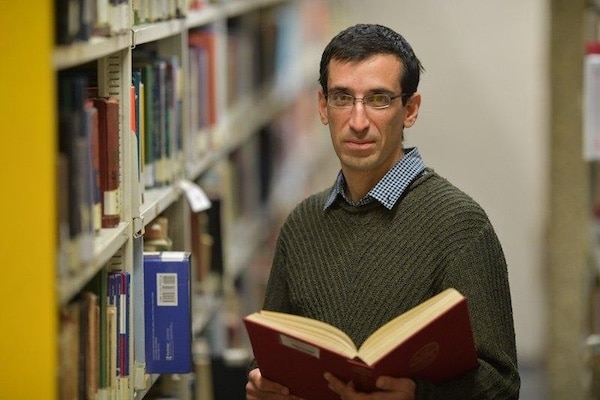On December 5, 2024, Israeli historian Lee Mordechai released a 124-page report titled “Bearing Witness to the Israel-Gaza War,” which the Israeli newspaper Haaretz called “the most methodical and detailed documentation in Hebrew… of the war crimes that Israel is perpetrating in Gaza.”
The report contains 1,400 footnotes including “eyewitness reports, video footage, articles, photographs, eyewitness evidence and [other] investigatory material, much of it recorded by Israeli soldiers.” After combing through this vast library of documentation, Mordechai, an associate professor at the Hebrew University of Jerusalem and a former fellow at Princeton University, concluded:
The enormous amount of evidence I have seen… has been enough for me to believe that Israel is committing genocide against the Palestinian population in Gaza.
1/ I am an historian and Israeli citizen. Over the past year I have been writing publicly about events in Gaza during the war, while collecting and documenting thousands of pieces of evidence and dozens of reports.
— Lee Mordechai (@LeeMordechai) December 5, 2024
On the day of the report’s release, Amnesty International also concluded that Israel is committing genocide against Palestinians in Gaza.
One section in Mordechai’s report, titled “The media, propaganda, and the war,” draws attention to the role of Canadian media in enabling Israel’s genocide of Palestinians. “Following a pattern from earlier wars in Gaza,” Mordechai writes,
the current war has been enabled and facilitated by massive media efforts to shape discourse in Israel as well as in the West—in countries such as the United States, Canada, the United Kingdom and Germany.
Mordechai draws attention to the CBC, specifically an anonymous essay by a former CBC producer published by The Breach earlier this year. As Mordechai explains:
A former media worker in the Canadian Broadcasting Corporation recounted how any reporting on Palestine faced major difficulties, including the cancellation of interviews, allowing the repetition of verifiably false pro-Israel claims on air, refusing to have discussions about difficult issues from Israel’s perspective (e.g. whether a genocide might be happening), not providing key context to current events (e.g. the situation pre-Oct. 7), editing out controversial material (e.g. references to genocide and starvation), adding disclaimers about the un-verifiable nature of even personal statements (e.g. the deaths of interviewees’ extended family members), removal of names and contact information of Palestinian speakers from internal databases, and ignoring genocidal statements by Israeli officials.
Following the publication of the essay, other CBC employees came forward with similar experiences. They asserted that the broadcaster’s anti-Palestinian bias has become a workplace safety issue. “I have seen egregious things happen,” said one employee,
like [CBC] putting on an Israeli official in the middle of December and letting him go off about beheaded babies and how Hamas is coming for us in Toronto and Vancouver and not challenging him.
Censorship is only the tip of the iceberg. As independent journalists have documented, anti-Palestinian bias is a feature of mainstream Canadian media.
An analysis of thousands of sentences published by the Globe and Mail, the Toronto Star, and the National Post found that “[t]he largest Canadian newspapers have given disproportionate attention to the deaths of Israelis, portrayed Israelis in more humanized ways, characterized their deaths as more worthy of indignation, and more often identified who was responsible for killing them.” This bias has resulted in “sanitizing political violence against Palestinians and unequally stirring emotions about Israeli deaths.”
Canadian media has also demonized pro-Palestinian activists and protesters. In the Globe and Mail, nearly half of the sentences used to describe student protests against Israel’s assault on Gaza were negative, including words like “hateful,” “violent,” and “hostile.” The Toronto Sun and the National Post called the solidarity camps “a threat to humanity’s values” and “a threat to Canada.”
At Global News, a Palestinian Canadian journalist named Zahraa Al-Akhrass was fired for pro-Palestine posts, which the outlet claimed “advocate[d] for violence” and constituted “serious, journalistic bias.” A manager had previously ordered Al-Akhrass to remove posts critical of government officials, as well as posts that contained the hashtags #FreePalestine, #GazaUnderAttack, and #GazaGenocide.
Many mainstream Canadian media organizations have either consciously or implicitly whitewashed Israeli war crimes while demonizing those protesting against them. At the same time, police forces in Canada have brutalized student encampments and solidarity marches, raided the homes of activists, and labelled a significant solidarity organization a “terrorist entity.” What’s more, the International Court of Justice has described genocide accusations as “plausible,” and Israeli Prime Minister Benjamin Netanyahu and former Minister of Defense Yoav Gallant are fugitives from the International Criminal Court.
As Mordechai’s report shows, Canada’s hypocrisy has not gone unnoticed even in Israel itself. Nevertheless, activists have been characterized as antisemitic by university administrators, media outlets, and politicians for saying what Mordechai, a Jewish historian in Israel, documents clearly: that Israel is committing genocide, and Canada is complicit.

